November 1 was a dark day for the Nigerian construction industry. With deaths edging closer to 50 people, the fall of the tallest tower in 360 Degrees Ikoyi is now easily among the most covered building collapse stories in the past decade.
Even though there were up to 7 building collapses in Lagos last year, and over 152 since 2005, the size of this project and its location, the upmarket neighbourhood of Ikoyi, has meant it has garnered an unprecedented amount of media and market attention. A blunder of this magnitude, however, leaves many culpable, and the public with more questions than there are answers. Where were the authorities? What happens to the buyers? What does this mean for luxury property in Ikoyi? Do similar properties risk the same occurrence? I’m here to discuss.
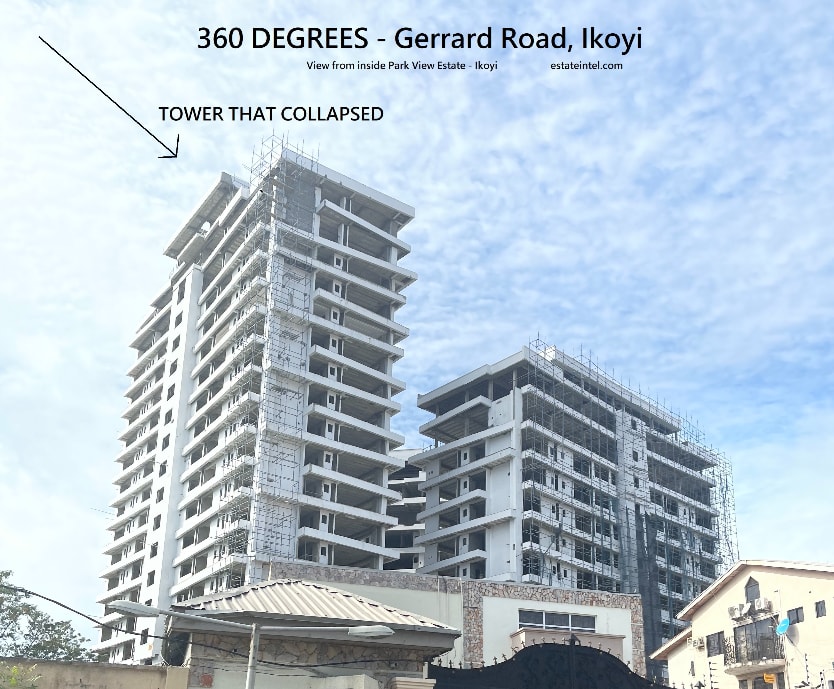
Here’s a summary of the facts and an accompanying timeline before we start.
Original Project Team:
- Client/Developer: Fourscore Homes Limited;
- Main Contractor: Fourscore Homes Limited;
- M&E Engineer: Degde global Services;
- Structural Engineer: Prowress Engineers Limited;
- Architect: Voltron;
- Number of Floors: Tower 1 & 2 – 15. Tower 3: 20.
- Number of Units: 39 units;
- Address: Gerrard Road Ikoyi;
- Approval Number: DCB/DO/2442
Timeline:
- Early 2019 – Construction Commencement;
- November 2019 – Estate Intel Starts Tracking Project;
- February 2020 – Letter published by Structural Engineers requesting dissociation;
- June 2021 – Site Closed down by LASBCA;
- 1st November 2021 – Collapse;
- 5th November 2021 – Governor Sanwo-Olu orders investigation;
- 8th November 2021 – Association of Nigerian Chartered Architects (ANCA) releases statement;
- 9th November 2021 – 42 bodies recovered from the site.
- 17th November 2021 – Nigerian Engineers Association releases statement.
Where were the authorities?
One of the biggest questions here is the role that the State played in this process. The Government has a role to make sure that all property built in the region under its control meets basic standards, and/or follows the region’s overall planning guidelines. In this instance, we can turn to the Lagos State Physical Planning Permit Authority (LASPPPA) and the Lagos State’s Building Control Agency. As shown on their website, the primary vision of the latter is:
‘To ensure that buildings in Lagos State are designed, constructed, and maintained to high standards of safety so as to avoid loss of lives and properties through its building regulatory system, we aim to achieve zero percent building collapse.’
Considering these words, this occurrence represents a failure of this government agency’s primary objective, which is to. quite literally, avoid everything that we saw on November 1st. Hence, we can begin the accountability discussion here.
Speaking on the occurrence, Temitope Runsewe, Managing Director of Dutum Construction, who are the main contractors for projects including The Art Hotel and Purple Lekki said: “I believe the collapse will finally wake the government and the industry up to our collective responsibilities; which is the safety and soundness of all construction projects above everything else. Perhaps this will even see us achieve legal backing and State-level domestication for the National Building Code that stipulates minimum safety and building standards for all construction projects. I would not put the blame on any one party. Rather, this is a period of reckoning for the entire construction industry and it is important that we take learnings from this sad occurrence.”
The current process for obtaining a construction permit in Lagos is shown in the summary prepared by Lagos State for the World Bank’s Ease of Doing Business 2020 Report. Of the 14 steps outlined, 6 (highlighted) require input from the LASBCA and 1 from the LASPPPA.
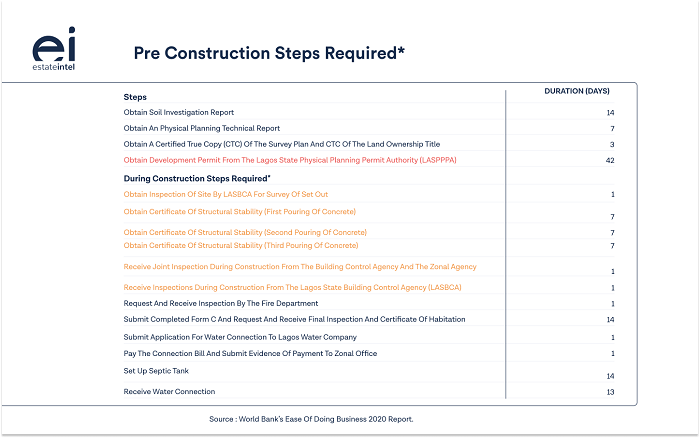
As is typical for multi-level projects, a cube test is meant to occur on every floor to test the strength of the concrete on each floor slab laid. Where cube tests fail to meet the minimum strength requirements, that floor is usually removed and restarted, or additional reinforcements are included. In February 2020, Prowess Engineering declared the withdrawal of their structural consultancy services and requested to be dissociated from the project via a formal letter. At this point, the team was confident that the cube testing process was properly completed for each of the floors in the other 2 towers. They could not, however, guarantee the structural integrity beyond the 4th floor in the final tower.
When we started tracking the project in late 2019, it became one of the leads that we shared with our clients seeking to sell their products/services through our Ongoing Projects Tool. One of our clients, who asked to remain anonymous, pointed to a unique difficulty in visiting the site during the early days of construction and particular hostility when interacting with project team members. Many of whom asked for their details to be taken off the project.
Existing contractors are not the problem
In the darkness of this event, there is some solace to be found when we consider that this collapse is not a failure of the contractors and construction professionals who execute similar projects. The lapses in standards and failure to execute as is expected almost guaranteed an outcome like this. It is quite unfortunate that the State building authorities did not take additional action after identifying an issue and stopping construction, to completely prohibit access to the site and begin the process of testing to determine whether a demolition was required.
If this situation had involved a more structured and experienced project team, who were following what is a standard practice among contractors executing in this space, then a much larger problem would be at bay.
What does this mean for luxury apartments?
As you read, marketing for properties in the Ikoyi region has not stopped and new projects have also been announced since the event, so there is no immediate indication that all high-rise luxury apartments will suffer. There will be, however, a shift to institutional developers who have a referenceable track record for executing quality. We noted this in the office sector as tenants sought to avoid occupying office properties owned by HNIs or non Institutional landlords. We also expect to see much more project team scrutiny from prospective buyers who are looking to purchase luxury properties.
Speaking with Adelani, Managing Director of CW Real Estate, a residential leasing and sales firm with 60% of their listings in Ikoyi, he explains that: ‘It comes off mostly as side comments and some skepticism buying an off-plan property, but buyers are now asking for more paperwork as part of their due diligence. In already completed units like Blue Water Lekki, the contractors and facility managers had to give extra assurances to their occupiers with paperwork showing the integrity of the building.’

What should I do about this?
If you intend to rent or buy property from a third party, our friends at The Building Estimator recommend that you ask for the following documents, especially if it’s a multi-level project:
- Approvals to cast from consultants on the project and the Lagos Material Testing Lab.
- Reinforcement test results from any State-approved materials test laboratory.
- Concrete test results from any State-approved materials test laboratory.
- Structural drawings by a COREN (Council for the Regulation of Engineering in Nigeria) Member engineer.
- Approval stage completion document prepared and signed by a structural engineer and other consultants.
Also, check the profile of any developer to see their track record using Estate Intel’s Directory.
If you intend to develop a project yourself, check the directory for contractors and evaluate their track record or project portfolio to determine whether or not they are a fit for you. Or just shoot us an email at projects@estateintel.com!
What happens next?
Off-plan buyers of luxury property typically pay for purchases in installments to mitigate risks. Payments are tied to construction milestones that may include reaching a particular floor, topping out, cladding, completion of internal works, or handing over keys. While some buyers of 360 Degrees Ikoyi may have paid in full to take advantage of typical discounts, others have not. The next steps taken by the State Government will inform what recourse may be available to buyers.
So far, Lagos State has taken the following steps:
- Suspended the LASBCA General manager;
- Created an investigative committee;
- Published the names of the deceased for DNA identification.
If we take a page out of the Lekki Gardens playbook, some form of settlement may be in the cards. This, however, may be difficult or drawn out depending on the internal controls at Fourscore Homes Limited, as the project sponsor has passed. Unconfirmed reports state that the 6-storey building by Lekki Gardens Estates Ltd that collapsed in March 2016 in Ikate, Lagos, killing 34 persons, started initially with arrests, but ended with an instruction for the company to pay some form of settlement to the State Government and families of the deceased. Buyers in that project were either refunded or reallocated units in other projects. It is unclear whether or not those payments have been made.
To bring the point back home, the utility of a superior process to ensure construction integrity or at the very least proper enforcement of (good) existing legislation is required to avoid similar events in the future. Property developers, by default, are profit-seeking, and usually seek to optimise expenses. Many are able to do this within the boundaries of law while, more importantly, keeping the lives of their buyers a major priority. Others, however, may not be as prudent or are quite frankly, reckless. The government has a responsibility to ensure that her authority is used to protect home buyers of affordable and luxury property alike.
Other notable building collapses in Nigeria are shown in chronological order below:
- 2006 – Residential Property in Ebute-Metta – Lagos. Reported Deaths – 25.
- 2006 – Nigerian Industrial Development Bank building, Lagos Island – Lagos. Reported Deaths – 1.
- 2014 – Guesthouse in Synagogue Church Of All Nations, Ikotun-Egbe – Lagos. Reported Deaths – 115.
- 2016 – Reigners Bible Church International, Uyo – Akwa Ibom. Reported Deaths – Up to 163.
- 2016 – Lekki Gardens Building Collapse, Ikate – Lagos. Reported Deaths – At least 34.
- 2019 – School in No. 53, Massey Street, Lagos Island – Lagos. Reported Deaths – 20.
Our thoughts and prayers remain with those who have lost their lives. You can share your comments with us on LinkedIn.




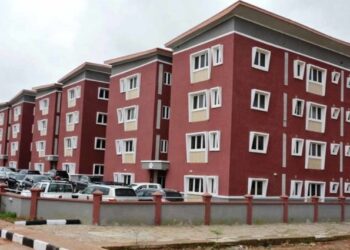
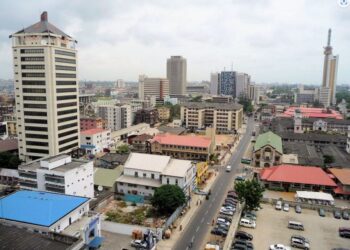
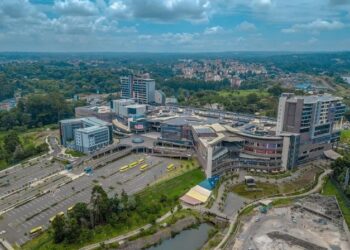
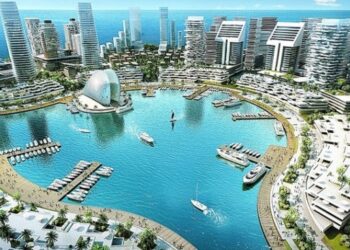












There are still so many questions to be answered concerning this building collapse and I hope the Lagos State Government’s report will do some kind of justice to it. But I want to think, as an investor Fourscore Homes had a relatively good track record of local and even overseas constructions. Could there have been an international dimension to this particular building failure or was its result of the corrupt Nigerian system, as many are touting. Or was it the personality and sharp maybe greedy business decisions of the owner that resulted in the eventual collapse of 21 floor building named FAITH, claiming the lives of its visionaire, dreamer and developer and 45 other innocent souls? Maybe time will tell, but I pray this marks a turning point in the construction industry in Lagos and Nigeria and also pray THIS particular kind of tradegy does not happen again in my lifetime and generation.